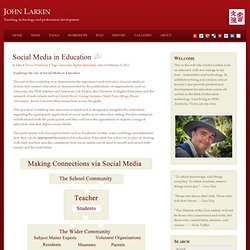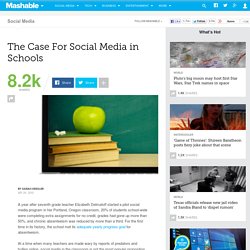

Social Media For Educators. The Educational Use of Fakebook. Fakebook is a cool tool for generating fictitious Facebook profiles about popular personalities in history.

This tool is very easy to use and has several educational advantages in education as we will see below. To start using Fakebook, you simply need to enter a name at the top of the page, then proceed to add friends, posts, comments and profile information. You can also save your work and edit it later. In a recent update, Fakebook Animated was introduced to allow users to watch the timeline of their fake Facebook profiles unfold over time.
Click Here for an example Educational Uses of Fakebook Fakebook can be use to : Chart the plot of a book or the development of a character or a series of historical eventsIt allows students and teachers to create imaginary profile pages for study purposesStudents can use it to create the outline of a biography of famous people in history 1- My Fake Wall. Storify · Create social stories. Social media in education ~ classrooms, schools & the organisation. Exploring the role of Social Media in Education The aim of this workshop is to demonstrate the importance and relevance of social media in twenty-first century education as demonstrated by the publications of organisations such as Educause, the PEW Internet and American Life Project, the Chronicle of Higher Education and the research of individuals such as Danah Boyd, George Siemens, Mark Pesce (blog), Bryan Alexander, Kevin Lim and other researchers across the globe.

This practical workshop has educators in mind and is designed to enlighten the individual regarding the appropriate application of social media in an education setting. Positive exemplars will be shared with the participants and they will have the opportunity to explore a range of education sites that deploy social media. The participants will also explore tools such as Facebook, Twitter, wikis and blogs and determine how they can be appropriately employed in education.
Duration 8 hours Learning Outcomes for Participants. Twiducate. Visibli Social Analytics. The Case For Social Media in Schools. A year after seventh grade teacher Elizabeth Delmatoff started a pilot social media program in her Portland, Oregon classroom, 20% of students school-wide were completing extra assignments for no credit, grades had gone up more than 50%, and chronic absenteeism was reduced by more than a third.

For the first time in its history, the school met its adequate yearly progress goal for absenteeism. At a time when many teachers are made wary by reports of predators and bullies online, social media in the classroom is not the most popular proposition. Teachers like Delmatoff, however, are embracing it rather than banning it. They argue that the educational benefits of social media far outweigh the risks, and they worry that schools are missing out on an opportunity to incorporate learning tools the students already know how to use. What started as a Facebook-like forum where Delmatoff posted assignments has grown into a social media component for almost every subject. 1. 2. 3. 4. Packrati.us - Bookmark your Twitter links. 6 ways to persuade your boss to say 'yes' to social media.
One of the most difficult problems in the social media world is getting the boss to understand and support an initial effort.

If you hope to pressure your boss into supporting your nascent social media initiative through a "grassroots" effort, it's not going to work. Not in the long run. For effective, lasting organizational change to occur, it must be supported from the top. How do you gain that support when your boss doesn't get it? Who is the "sponsor" of your social media effort? Let's be clear about the term "sponsor. " Here are six ideas to get the boss on-board: 1. 2. Small victories allow you to announce lots of happy news when you need it most—at the beginning!
3. Remember that any activity in an organization must somehow relate back to money, whether it's profits, donors or funding. 4. 5. 6. If your boss is intelligent and well-meaning, eventually she should come around. Mark Schaefer is the author of "Return On Influence" and blogs atgrow, where this article originally appeared.